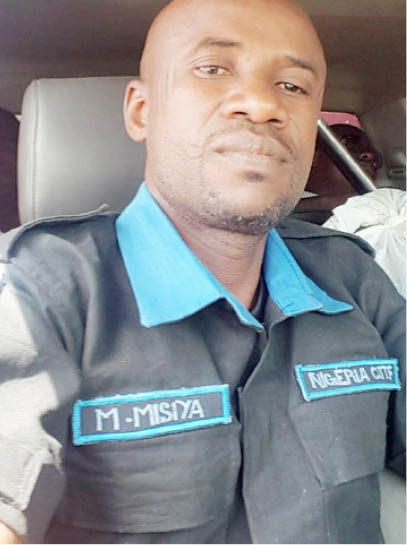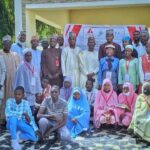For eight years, Mu’azu Alhaji Misiya worked in the comfort of a bank. But in 2014, to save his native Bama and his state, he dropped his pen and picked up arm to help hunt down insurgents.
Against all odds, Mu’azu Alhaji Misiya from Bama town, Borno State, voluntarily resigned his banking job and joined the civil defence forces, the Civilian Joint Task Force (CJTF) to work with soldiers in counterinsurgency efforts.
Misiya, who was driven by passion to change job, said he has enjoyed every effort he has made fighting the insurgents.
- Quit notice: Youths attack Fulani communities in Oyo
- COVID-19: One year after Wuhan lockdown, Nigeria, others still suffering
“I have worked with the military to liberate a number of towns, arrest insurgents and free abducted persons,” he said.
But how did the journey from banker to insurgent hunter begin for Masiya?

It started when a state of emergency was declared in Borno State over the activities of insurgents and movement was restricted.
“We could not go to work so we had to join the fight,” he said. “Already, I attended military primary and secondary schools, so most of my friends are soldiers.
“One of them, Mohammed Ali, who was a driver in the army, asked me to work with his Commanding Officer (CO) in identifying and apprehending the insurgents, which I agreed to under the condition that no one should reveal that we are the sources of any credible information.
“We met his CO, who also welcomed the idea and assured me of my safety.
“We shared information which led to many arrests and seizure of weapons.
“Some of the culprits were found with more than one gun in their rooms.”
He said the covert exercises on the search for the insurgents in Bama yielded results and became popular after troops raised awareness of the dangers of hiding information about the attackers.
People, mostly youths in Maiduguri, not only provided information about the insurgents but went after them.
“Thereafter, about 300 volunteer members of the self-appointed group called Yan Gora joined us at Bama to suppress the insurgents.
“We were only eight in Bama who joined the 300 Gora men and took oath not to undermine the counterinsurgency effort. We conducted a successful operation before they returned to Maiduguri,” he said.
Misiya said when the restriction was eased in 2013, his bank, First Bank, closed its branch in Bama and employees were moved to other branches in Maiduguri.
Misiya said that he returned to Bama every day after closing from work, until 2014 when insurgents seized the town and he was forced to relocate to Maiduguri with his wife and eight children.
“The CO was transferred to another formation before the incident.
“However, we maintained close ties with the soldiers and officers and joined them after nine months to recapture Bama.
“Thereafter, I returned to Bama where I spent the weekend working with 23 volunteers and usually travelled with a military convoy to Maidiguri either on Sunday or Monday, where I worked.
“I received queries twice for lateness,” he said.
The former CO was later reposted to Bama as Brigade Commander after a brigade was established there and he requested Misiya to leave the banking job and work with troops as an informant.
“I told the CO that I was ready to resign my appointment with the bank and join them if I could get a job with the state government which he promised me.
“He even met top government officials who accepted to give me a job in the public service.
“I resigned from the bank but seven years after, I could not get a job with the government.
“I paid attention to the effort being made to defeat the insurgents.
“Most of my contemporaries were not pleased with my resignation but apart from the job, I was into a lot small businesses and livestock farming.
“I had 58 cattle before the insurgents captured Bama and moved them away,” he said.
Misiya who later enlisted as CJTF said he had performed many operations with the military aimed at defeating the insurgents including eleven different rapid surprise attacks on insurgents’ hideouts in Sambisa National Park.
The raids included Crackdown 1, 2, & 3, as well as Final Rescue 1 &2 among others.

“One of the raids I could remembers was in 2013 when we overpowered the insurgents in the park and seized a lot of their weapons and vehicles.
“I took part in the onslaughts which led to the recapture of Bama, Banki, Gulumba and Kumshe. I was with the troops at many clearance and deep operations,” he said.
Most insurgents captured, he said, were commanders and influential leaders who were recognized by their insignia.
He said men who were higher in rank, braid their hair while others do not comb theirs or have haircuts.
There were those who had dreadlocks similar to those of Rastafarians among the leaders.
One of the raids that frightened and shocked Misiya was Final Rescue 2 in Sambisa where four of his subordinates died including one Moru Chuli, Bako, Alebon and Usam.
He said two died on the spot from an explosion while Bako suffered chest and stomach injuries from the fragments.
Bako pleaded with Misiya to look after his wife and children before he was flown to a hospital where he died.
The deceased had also told the brigade commander that the wedding of his daughter was around the corner then.
Misiya said that since 2017, when Bako died, the commander gave monthly allowances to Bako’s family, even after his transfer from Bama.
A former governor also gave N1.5 million to the family out of which N1.3 million was used to buy a house for them.
For Misiya, there was also the touching instance he helped rescue his brother’s wife from Sambisa. She had been abducted by insurgents in 2014. She was rescued in 2017. Their first encounter left Misiya stunned.
“I did not recognize her in a group of women in the forest but when she called my name, I saw her holding a boy and a new baby,” he said.
“She was pregnant with a baby boy when she was abducted and gave birth while in captivity but the baby died.
“She got pregnant again and had another boy.
“Unfortunately, three months before the rescue, her real husband (my brother) died in a car accident.”
After her rescue, Misiya took her back to her parents in Maiduguri.
Operation Crackdown 2, seemed to have been the most successful joint outing Misiya featured in because troops pursued insurgents to Njimiya, a village in the middle of the Sambisa park inhabited by abducted persons, insurgents and their women.
“We arrived there at about 5pm together with troops from the neighboring countries and we were held in that spot for seven days not because we were overpowered but it took us time to get spare parts and fix our vehicles.
“We dealt the insurgents a mighty blow. Soldiers from Bita joined us and we reached a thick tree plantation near a river with many shea trees (Vitellaria paradoxa), Kaamp in Kanuri Language of which the military later renamed the area as Kaamp zero to mean pure shea trees.
“There is a dense canopy, which blocks sunlight. The insurgents had fled by the time we reached the area but we burnt all the items we found, including scrap vehicles; as usual they must have returned after our departure,” he said.
According to him, the counterinsurgency campaigns that started eleven years ago have been successful and have reduced the activities of the insurgents.
Places once dominated by insurgents have since been reclaimed by soldiers, Misiya said.
The success, many observers said, are largely due to the impact of local volunteers and vigilantes who get paid a token for their services.
He said 547 volunteers, including 200 CJTF, 150 hunters and 150 members of the Kesh Kesh group receive a monthly allowance of N10, 000 during the previous administration.
The money was recently increased to N15, 000 with injured volunteers receiving free medications from the military.
Monthly allowances are paid to families of deceased CJTF members apart from which there was no other benefit, he said.
The insurgency has displaced over 2 million people in Borno, but Misiya said that is not the only population that has suffered as the wild life in the famous Sambisa reserve has suffered as well.
He said Sambisa, which had different species of wild animals, had experience a lot of human encroachment, which forced some wildlife to migrate to other habitats.
The park extends from Bama to Damboa, Buni Yadi and Bauchi State, he said.
“In 2014 during a clearance operation in Sambisa, I saw a group of leopards, about 10 in number,” he said.
Misiya, who obtained a diploma in computer science, and spent eight years as a banker before he resigned, said he plans to start a small scale business at the end of the counterinsurgency campaigns.

 Join Daily Trust WhatsApp Community For Quick Access To News and Happenings Around You.
Join Daily Trust WhatsApp Community For Quick Access To News and Happenings Around You.


